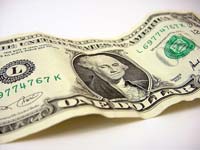US Treasury 'ignores' dollar
The U.S. government's adherence to the "strong-dollar" mantra, even as the currency plumbs record lows against the euro, has made markets skeptical that a finger will be lifted to stop a broad decline.

In all likelihood, the U.S. Treasury will not step in to save the dollar any time soon and the Bush administration may be the first since the gold standard was dropped in 1971 to not intervene in the currency market. In fact, the Treasury has not stepped into the currency market since September 2000, when it helped prop up the euro.
But the intention of the strong-dollar policy may be changing under current U.S. Treasury Secretary Henry Paulson to refer to the dollar's dominant role as a reserve currency and its significant place in an increasingly global marketplace.
On the eve of a Group of Seven rich nations meeting, the dollar dropped to an all-time low against a basket of major currencies, pushing the euro above $1.43 for the first time ever -- about 48 hours after Paulson reiterated that a strong dollar is in the interest of the United States.
After weakening 8 percent in 2006, the dollar has fallen another 7 percent so far this year, mostly because of expectations that the Federal Reserve will have to lower borrowing costs further to stave off an economic recession.
On the one hand, the dollar's downward march seems in line with one of Paulson's oft-repeated phrases: that exchange rates should be set in competitive markets based on fundamentals.
So, if the U.S. economy is showing signs of weakness, particularly because of its ailing housing sector, then the greenback should weaken relative to other currencies with more stable economies.
However, the insistence on saying a strong dollar is best for the U.S. economy -- when it is falling -- leaves many market participants scratching their heads.
"I think we have an ignore-the-dollar policy," said Leo Melamed, chairman emeritus of the Chicago Mercantile Exchange, Reuters reports.
"It's laughable to say we have a strong-dollar policy," said Melamed, who founded the world's first market for financial futures. "When you have a current account deficit like we do, an interest rate factor that is moving downward, and the credit problems that the United States has, it really is difficult to say we have a strong-dollar policy," he said.
The US dollar surrendered more ground to major currencies in afternoon trading in Asia on Friday as investors moved into safer, low-yielding assets amid growing fears the sub-prime mortgage crisis is far from over.
The greenback dived to near-record lows against the euro and the lowest level in nearly three weeks against the yen after the Bank of America (NYSE:BAC) , the largest deposit bank in the US, reported a 32 percent fall in third-quarter earnings due to credit market write-downs and loan losses. The report fuelled concerns about the outlook for the US economy.
At 4.35 pm (0635 GMT), the US dollar was buying 115.005 yen compared with 115.57 yen in midmorning Sydney trade and 115.60 yen in late New York trade. The euro was up at 1.4296 US dollars from 1.4293 US dollars in Sydney and 1.4290 US dollars in New York.
The release of Bank of America's disappointing third-quarter result coincided with stronger-than-expected new weekly jobless claims which together increased the likelihood of the Federal Reserve cutting interest rates at its meeting on October 31. A lower interest rate will drain support for the greenback.
''The weak data following a week of increasing concerns over the state of the US economy stated by US officials and renewed credit market concerns has the Fed Funds futures pricing in a 70 percent chance of a Fed rate cut at their meeting on October 31. That is up from just over 30 percent earlier in the week,'' said John Noonan, an analyst at Thomson IFR.
The dollar could fall further after the conclusion of the G7 meeting of finance ministers in Washington on Friday. Currency traders expect the ministers to focus on increasing the value of the Chinese yuan rather than searching for ways to reverse the sustained weakness in the dollar, cnn.com reports.
Source: agencies
Subscribe to Pravda.Ru Telegram channel, Facebook, RSS!





